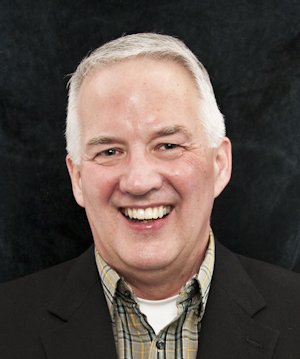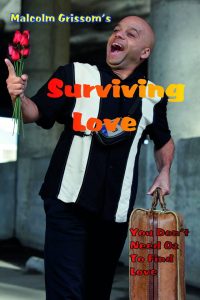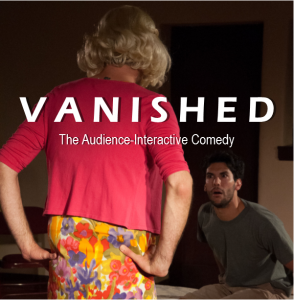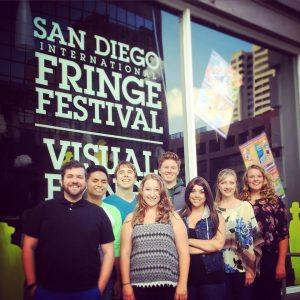Fringe’s Tuesday Got Better As It Went
Part of the charm of the San Diego International Fringe Festival is that it brings to town groups and individuals who don’t fit the mold. Part of its challenge is that it’s pretty hard to predict what you’ll get. Some patterns have emerged, though, and here’s two of them. One, the Fringe attracts solo acts, often stand-up comics or personal memoirists who have an hour to tell their audiences a story that will be affecting in some way. Two, it also attracts local theatre companies that exist because the writers, performers and creative artists who volunteer there love theatre or wish to hone their skills in some way.
Examples of both of these patterns were on display last night, and their quality improved as the evening went along.
Malcolm Grissom’s Surviving Love is an example of the first pattern. The San Francisco-based Mr. Grissom acts like a stand-up artist, but not one who knows how to handle an audience that needs to be persuaded to enjoy his humor. He began his set by wondering aloud if he should even perform, because the audience was so small, then he yielded what turned out to be a five-minute portion of his time to another artist who wanted to promote his show by presenting a mostly incoherent preview of it .The other artist was representing It Ain’t Messy ‘Til It’s Sally Jesse (aka the neighbor play). You’ve been warned.
Once Mr. Grissom actually got going, he attempted to interact with audience members about their definitions of love, the topic of his story. This portion was clearly ad-libbed and ended up having little or no relationship to the story that was to follow. Moreover, apparently at the invitation of the artist, a photographer was taking flash pictures throughout the performance, despite the festival policy of no photography, announced before Mr. Grissom took the stage.
What did follow was a tale of dreams of love that were usually dashed by the realities of life. The details were complicated, and they don’t matter all that much. Mr. Grissom ended up visiting Hawaii, experiencing both love and rejection from family there, and being disappointed by a planned retreat that he was convinced would teach him how to find love.
Sadly, the audience responses on the topic of love were more on track that anything Mr. Grissom had to offer.
The second pattern was on display in Vanished, a 2012 play by local writer Steven Oberman. For this revival, Mr. Oberman served in addition as producer, director, and star. Family members, apparently, served as the production’s crew.
What begins as a domestic drama centered on an impending divorce is disrupted by the introduction of a science fiction element: all of a sudden men and women exist in parallel universes. They are occupying the same spaces but are unaware of the presence of the other, at least for a good deal of time.
As the characters get used to this disruption, they start to decide how to cope with the absence of the other gender. Some of the adaptations are “easy” (it is possible to be satisfied sexually by a person of the same gender, even if you are attracted to the other gender), and others, probably more important, will be more difficult. Men and women both learn lessons along the way, though the play’s focus remains on the domestic front.
The second disruption to expectations is that audience members are recruited to portray secondary characters with few or no lines. This disruption requires a couple of stops in the performance while the audience members are called out, briefed, and put into position for their entrances. Seeing fellow audience members on stage did seem to enhance the enjoyment for the group at the performance I saw, however.
Finally, there is a third disruption: the play has two endings, and the audience gets to vote which one it wants to see.
Mr. Oberman’s writing is by no means profound, but it is not inept, either. His performers (Gabriela Nelson, Christopher Winters, and Virginia Gregg) seemed to be relaxed into their characters, and the material didn’t seem to demand much more of them.
All in all, Vanished is harmlessly middlebrow and could be entertaining, if that’s what you’re expecting.
There’s a good deal more ambition in The Things We Never Say, a world premiere song cycle by Thomas Hodges, produced and directed by Ira and Nathan Bauer-Spector of San Diego’s Breakthrough Workshop Theatre. The company’s website describes the group of primarily young performers as developing skills that will allow them to be “in the moment” as actors and break through personal barriers. The Things We Never Say illustrates that process in the context of a collection of songs that describe breakthroughs in individual lives.
In eleven songs over the course of fifty-five minutes, Mr. Hodges illustrates breakthroughs that young people experience, some of them positive, some not so. The situations may or may not have been ones that the performers have experienced. I doubt, for example, that Kellen Gaughan has been a homeless youth panhandling in the subway (“Underground”), but Wilfred Grant T. Paloma (“Coronado Lights”) may have experienced being rejected by a boy he thought he loved.
The solution: “One Foot in Front of the Other,” may not be the most enlightened one available, but it is nevertheless reasonable advice, as well as the best song in the show.
Mr. Hodges’ has a good ear for the theatre song genre, and his songs show connection and progression, in terms of providing a narrative through-line. They have a distinctive style, which, at first hearing at least, could be judged harshly as “sounding all the same,” but I, for one, am not going there. The song cycle is passionate, as befits a young composer, and it was clearly a crowd-pleaser for the youthful audience that crowded into the acoustically difficult Spreckels RAW Space last night.
Ira Bauer-Spector is clearly very good at working with young actors. I still recall an excellent one-off production of Zanna Don’t! that he directed. He has staged the musical numbers with style, and the cast (which also included Catherine Caldwell, Jazley Genovese, Danielle Gulihur, and Meagan Pitcher) exhibits a level of confidence and maturity that exceeds that of many young actors.
At the end of the performance, individual cast members told breakthrough stories that were their own, as part of the closing song, “Dear Shadow.” That the eloquence and commitment with which these stories were told was the highlight of the evening is both a tribute to what this company purports to do and an unfortunate commentary on the quality of The Things We Never Say.
[box]Surviving Love performs Wednesday at 9pm, Thursday at 10:30pm, Friday at 6pm, Saturday at 12:30pm, and Sunday at 4pm at the RAW Space Off Broadway. Vanished performs Thursday at 6pm, Friday at 9pm, and Sunday at 1pm, at the 4th Floor Arts Incubator in the Spreckels Building. The Things We Never Say performs Thursday at 6pm and Saturday at 4pm, at the RAW Space Off Broadway. These are all in and around the Spreckels Theatre, and downtown parking is metered during the day Monday through Saturday. Garages are also available, including Horton Plaza, which allows three hours of free parking with validation.[/box]

In addition to reviewing theatre for San Diego Story, Bill also reviews for TalkinBroadway.com. He is a member of the San Diego Theatre Critics Circle and the American Theatre Critics Association. Bill is an emeritus professor in the School of Journalism and Media Studies at San Diego State University.





